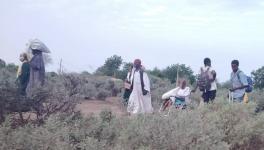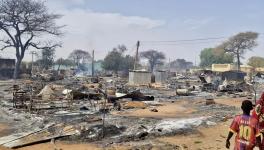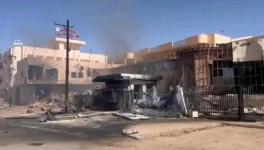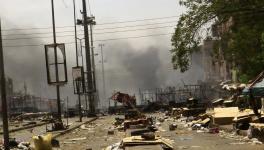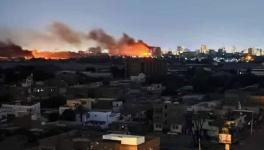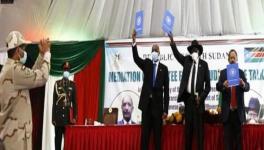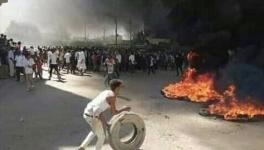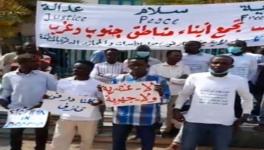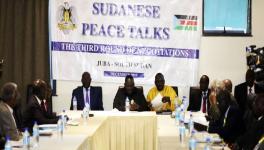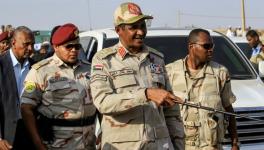Sudanese Security Forces Open Fire on Protesters
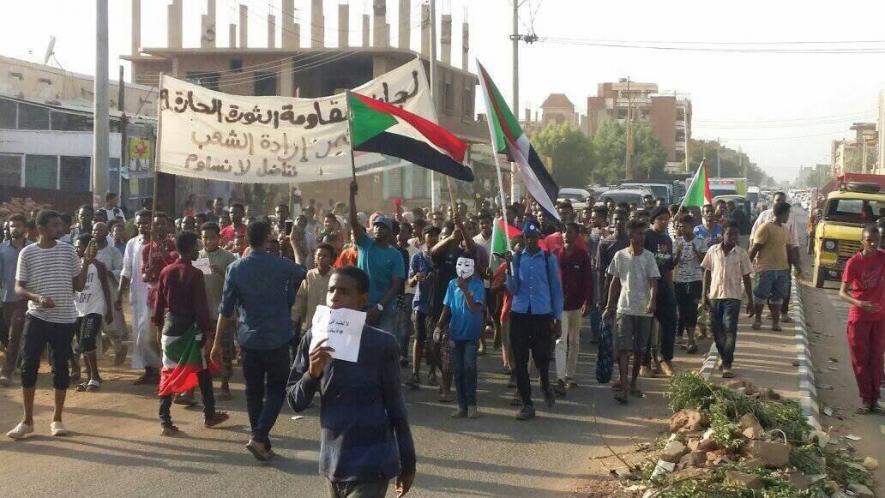
People mobilized in different cities in Sudan to denounce the latest episode of the Sudanese security forces' deadly repression. Photo: SPA
Sudanese security forces opened fire on a demonstration on July 29 just a day before talks are scheduled to resume between sections of the opposition coalition and the military junta. The Sudan Doctors Committee (SDC) reported that four were killed and several others were injured.
According to the statement released by the SDC, the protesters were school students who had organized a rally in the city of Al-Abyad, to protest against the “the dire situation of the educational facilities and the lack of water and transportation.”
Two days before, on July 27, protesters in several neighborhoods of Khartoum, the capital city of Sudan, took to the streets on Saturday, July 27, expressing their rejection of the report released by the Attorney General’s on the massacre of protesters on June 3.
The report, which does not hold a single member of the military junta responsible, understates the number of dead and injured. It also refuses to acknowledge that dozens of women and boys were raped and does not consider those who have been missing since the day of the massacre.
While maintaining that those identified as culprits were acting in violation of orders, the report refuses to mention the names of those it identifies as perpetrators. They are only referred to by initials of their names.
The report of this ‘investigation’ was commissioned by the military junta. The vice-president of the junta is head of the militia, Rapid Support Forces (RSF), which committed the massacre of protesters on June 3. The protesters had been partaking in a sit-in outside the army HQ in Khartoum demanding a transfer of power to civilian authority.
When the “military council is itself accused in this case,” they cannot also “be the judge” in it, the Sudanese Professionals Association (SPA) said in a statement rejecting the report. The SPA, a coalition of unions and professionals associations, has been at the forefront of organizing agitations since the uprising started in December last year.
“The blood of the martyrs…is not open to political bargaining”
Sudan Doctors Committee (SDC) also refuted the Attorney General’s report, which estimates the death toll of the June 3 massacre to be 87. In their statement on the report, the SDC clarified that “the forensic report in the early days of the massacre referred to more than 90 martyrs, more than 80% of whom were hit by live bullets.”
After the massacre, the militiamen also attacked doctors in hospitals, and blocked their access to injured protesters. At the time, the SDC, whose doctors were risking their lives by treating the injured in makeshift camps, documented at least 160 deaths. This number included the corpses tied to rocks and thrown into the Nile that surfaced a day after. The report, however, maintains that these bodies have nothing to do with the attack on the mass demonstration.
While the report estimates the number of injured to be 168, the SDC documented around 700 injuries, apart from the dozens of cases of rapes, which the report denies. The many more that have been missing since the massacre are also not considered in the report.
The report also states that there were only 59 witnesses to the massacre. Such a small number is simply “not commensurate with the scale of the crime or the large numbers of citizens in the picket scene who have witnessed the crime,” SDC said.
“We at the medical union will be waiting for the work of the independent inquiry commission [under a] civilian government to reveal the facts and with which we will cooperate by providing all the evidence…we have obtained through the work of the field clinics,” SDC’s statement, adds.
They conclude that: “The blood of the martyrs, the wounded, the injured and the fate of the missing is not cheap and is not open to political bargaining, and no political agreement” compromising with justice for the killed can be legitimate.”
The Declaration of Freedom and Change Forces (DFCF) – an opposition coalition which includes a number of political parties along with the SPA – has also refuted the report.
DFCF spokesperson Ismail Altaj highlighted that the military junta had consulted the Attorney General before the massacre, and alleged that “The Attorney General’s Office [itself] is suspected of participating in the June 3 massacre”.
In conversation with the Sudan Tribune, he commented, “This report confirms the dire need to reform the justice institutions in Sudan, including the Office of the Attorney General”.
Condemnation of the report has also come from the sections of the DFCF, such as the Sudanese Congress Party (SCoP), which, along with the centrist National Umma Party (NUP), that signed a political agreement with the military junta.
“As expected…a report was drafted with the sole objective of hiding the facts and burying them in the rubble,” the SCoP’s statement reads.
DFCF Divided
While there is agreement that the Attorney General’s report is a sham, the DFCF is still divided on how to go forward with talks with the military junta. Both the SCoP and NUP are continuing to engage with the military junta to seal an agreement on power sharing in the transitional government by signing a constitutional agreement.
Over the last few days, discussion between these parties and the military junta has been over the latter’s demand that itself as well as the eleven member Sovereignty Council (or Presidential Council) to which it will appoint five members, must be granted immunity from prosecution.
Other sections of the DFCF – including the SPA, the Sudanese Communist Party (SCP) which has been consistently backing the SPA, the Baathists and Arab nationalists – are not negotiating with the military junta. They also refused to sign the political agreement which preceded the discussions on constitutional declaration, which are set to resume tomorrow.
These sections of the DFCF maintain that the political agreement is a compromise with the goals of the revolution, a compromise which will be sealed if the constitutional agreement is signed by all forces. As such, they have refused to be signatories and have called on the masses to continue agitation in the streets until the military junta is overthrown and a civilian authority appointed by the DFCF takes the reigns for the transitional period.
The armed rebel groups which are engaged in a civil war with the state have also rejected the agreements. Negotiating peace with these groups and putting an end to the civil war is one of the primary tasks set for the transitional period in the Declaration of Freedom and Change. The DFCF was founded when the different opposition parties came together to sign this declaration.
Last week, a delegation of the SPA met representatives of the Sudan People’s Liberation Movement- North faction led by Abdelaziz El Hilu (SPLM-N El Hilu) in Ethiopia’s capital city of Addis Ababa.
According to Radio Dabanga, “The SPLM-N El Hilu confirmed its support for the SPA, considering the association the most important component of the popular uprising in Sudan. The parties agreed to open channels of communication and coordination, and to continue to have direct meetings.”
Get the latest reports & analysis with people's perspective on Protests, movements & deep analytical videos, discussions of the current affairs in your Telegram app. Subscribe to NewsClick's Telegram channel & get Real-Time updates on stories, as they get published on our website.









